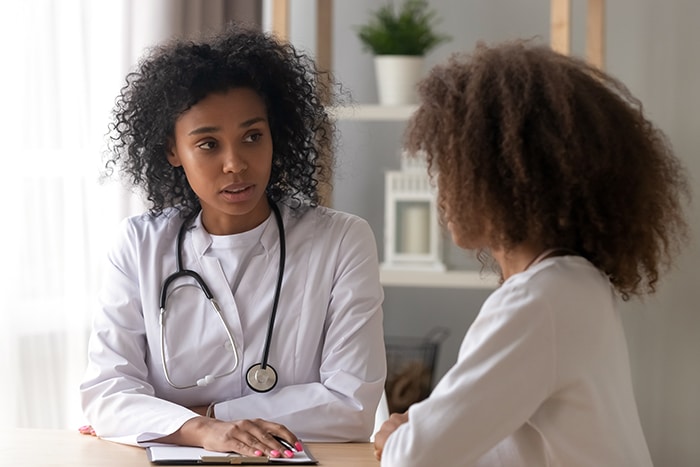- (212) 686-6066
- Mon - Sat: 7am - 8pm
- Sun: 9am - 5pm

Trichomonas (or “trich”) is a very common sexually transmitted infection (STI) that is caused by infection with a protozoan parasite called Trichomonas vaginalis. Although symptoms of the disease vary, most individuals who have the parasite cannot tell they are infected. Trichomonas can be cured with a single dose of prescription antibiotic medication (either metronidazole or tinidazole) pills which can be taken by mouth. It is okay for pregnant patients to take this medication. Some people who drink alcohol within 24 hours after taking this kind of antibiotic can have uncomfortable side effects.
People who have been treated for Trichomonasca can get it again. About 1 in 5 people get infected again within 3 months after treatment. To avoid getting re-infected, make sure that all of your sex partners get treated too, and wait to have sex again until all of your symptoms go away (about a week). Get checked again if your symptoms come back.
Trichomonas is considered the most common curable STI. In the United States, an estimated 3.7 million people have the infection, but only about 30% develop any symptoms of Trichomonas. Infection is more common in women than in men, and older women are more likely than younger women to have been infected.
The parasite is passed from an infected person to an uninfected person during sex. In women, the most commonly infected part of the body is the lower genital tract (vulva, vagina, or urethra), and in men, the most commonly infected body part is the inside of the penis (urethra). During sex, the parasite is usually transmitted from a penis to a vagina, or from a vagina to a penis, but it can also be passed from a vagina to another vagina. It is not common for the parasite to infect other body parts, like the hands, mouth, or anus. It is unclear why some people with the infection get symptoms while others do not, but it probably depends on factors like the person’s age and overall health. Infected people without symptoms can still pass the infection on to others.
About 70% of infected people do not have any signs or symptoms. When Trichomonas does cause symptoms, they can range from mild irritation to severe inflammation. Some people with symptoms get them within 5 to 28 days after being infected, but others do not develop symptoms until much later. Symptoms can come and go.
Men with Trichomoniasis may feel itching or irritation inside the penis, burning after urination or ejaculation, or some discharge from the penis.
Women with Trichomoniasis may notice itching, burning, redness or soreness of the genitals, discomfort with urination, or a thin discharge with an unusual smell that can be clear, white, yellowish, or greenish.
Having Trichomoniasis can make it feel unpleasant to have sex. Without treatment, the infection can last for months or even years.
Trichomonas can increase the risk of getting or spreading other sexually transmitted infections. For example, Trichomonas can cause genital inflammation that makes it easier to get infected with the HIV virus, or to pass the HIV virus on to a sex partner.
Pregnant women with Trichomonas are more likely to have their babies too early (preterm delivery). Also, babies born to infected mothers are more likely to have an officially low birth weight (less than 5.5 pounds).
It is not possible to diagnose Trichomonas based on symptoms alone. For both men and women, your Parkmed NYC physician must do a check and a laboratory test to diagnose Trichomonas.
Trichomonas can be cured with a single dose of prescription antibiotic medication (either metronidazole or tinidazole) pills which can be taken by mouth. It is okay for pregnant women to take this medication. Some people who drink alcohol within 24 hours after taking this kind of antibiotic can have uncomfortable side effects.
People who have been treated for Trichomonas can get it again. About 1 in 5 people get infected again within 3 months after treatment. To avoid getting re-infected, make sure that all of your sex partners get treated too, and wait to have sex again until all of your symptoms go away (about a week). Get checked again if your symptoms come back.
Using latex condoms correctly every time you have sex will help reduce the risk of getting or spreading Trichomoniasis. However, condoms don’t cover everything, and it is possible to get or spread this infection even when using a condom.
The only sure way to prevent sexually transmitted infections is to avoid having sex entirely. Another approach is to talk about these kinds of infections before you have sex with a new partner, so that you can make informed choices about the level of risk you are comfortable taking with your sex life.
If you or someone you know has questions about Trichomoniasis or any other STI, especially with symptoms like unusual discharge, burning during urination, or a sore in the genital area, check in with a Parkmed NYC and get some answers.
Sexually Transmitted Infections (STIs), previously known as Sexually Transmitted Diseases (STDs) are infections and parasites that can be passed between partners during sexual contact: oral, anal, vaginal or skin to genital contact. There are 20 million new cases of STIs reported in the US each year and half those cases are in people ages 15-24. This is why getting STI screenings as soon as one becomes sexually active is key to maintaining sexual health for you and those you love. Because most STIs have no noticeable symptoms seeing your doctor and asking for STI testing as part of a yearly checkup is important for your general and sexual health.
Many have no noticeable symptoms, but some STIs can have serious reproductive health effects for both partners. The only way to protect yourself is to practice safer sex practices and to be tested regularly for STIs by your doctor or our staff and STI clinic NYC.